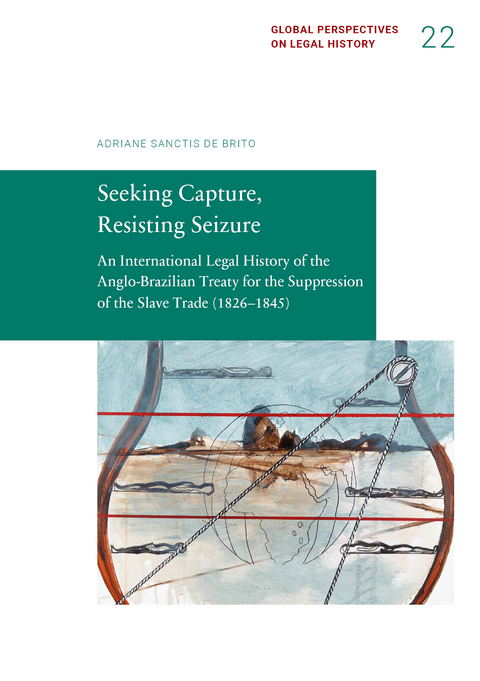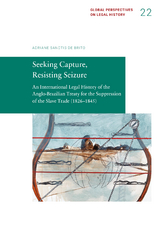Seeking Capture, Resisting Seizure
An International Legal History of the Anglo-Brazilian Treaty for the Suppression of the Slave Trade (1826–1845)
Seiten
2024
Max-Planck-Institut für Rechtsgeschichte und Rechtstheorie (Verlag)
978-3-944773-42-1 (ISBN)
Max-Planck-Institut für Rechtsgeschichte und Rechtstheorie (Verlag)
978-3-944773-42-1 (ISBN)
The treaties to suppress the slave trade were the subject of intense legal battles and debates in the first half of the 19th century. By delving into the legal disputes that took place within the context of the Anglo-Brazilian treaty, this book highlights the political importance of what might at first glance be perceived as little more than argumentative hurdles over the rules and proceedings regarding the search and capture of ships. Some of these legal battles were carried out in the correspondence between the Foreign Offices, sometimes between diplomatic representatives or within mixed commissions, while still others involved the process of interpretation and the resignification that took place over the course of years and involved a multiplicity of exchanges between various actors and institutions.
Britain constantly pushed to expand the legal use of force and possibilities of capture within the spaces outlined by the treaty regime. Brazil actively engaged in the legal interpretation, and in so doing created an argumentative onus that would later continue to transform British legal approaches and the very expectations about the content of the law the two parties were applying.
By constantly challenging the scope and limits of the treaty, Brazilian representatives slowed down the process of abolishing the slave trade, thus preserving the perverse practice, while at the same time protecting Brazil’s independence against the expansion of British interference. Whether reading the bilateral treaty clauses as analogous to or differently from prize law or general international law, the day-to-day interpretation forged anti-slave trade rules that kept ships, instead on enslaved people, protagonists of slave trade suppression mechanisms.
This history of the Anglo-Brazilian treaty provides more detail about the mechanisms created by international law to combat the slave trade. It also reveals the complex legal translations of state inequality, humanitarianism, violence, and the fine line between war and peace.
Britain constantly pushed to expand the legal use of force and possibilities of capture within the spaces outlined by the treaty regime. Brazil actively engaged in the legal interpretation, and in so doing created an argumentative onus that would later continue to transform British legal approaches and the very expectations about the content of the law the two parties were applying.
By constantly challenging the scope and limits of the treaty, Brazilian representatives slowed down the process of abolishing the slave trade, thus preserving the perverse practice, while at the same time protecting Brazil’s independence against the expansion of British interference. Whether reading the bilateral treaty clauses as analogous to or differently from prize law or general international law, the day-to-day interpretation forged anti-slave trade rules that kept ships, instead on enslaved people, protagonists of slave trade suppression mechanisms.
This history of the Anglo-Brazilian treaty provides more detail about the mechanisms created by international law to combat the slave trade. It also reveals the complex legal translations of state inequality, humanitarianism, violence, and the fine line between war and peace.
| Erscheinungsdatum | 30.01.2024 |
|---|---|
| Reihe/Serie | Global Perspectives on Legal History ; 22 |
| Verlagsort | Frankfurt |
| Sprache | englisch |
| Maße | 148 x 210 mm |
| Gewicht | 360 g |
| Themenwelt | Geisteswissenschaften ► Geschichte ► Regional- / Ländergeschichte |
| Geschichte ► Teilgebiete der Geschichte ► Militärgeschichte | |
| Recht / Steuern ► EU / Internationales Recht | |
| Recht / Steuern ► Rechtsgeschichte | |
| Schlagworte | Abschaffung des Sklavenhandels • Anglo-brasilianisches Abkommen • Brazil • Great Britain • History of the Anglo-Brazilian treaty • International Law • Peace • Piracy revisited • prize law • Regeln zur Kaperung von Schiffen • Rules and proceedings regarding the search and capture of shipsung von Schiffen • Slave trade Suppression • The Aberdeen Act • The Brazilian Debut: Consenting to the Slave Trade Abolition • Weaponising Treaties: The British Fight Against the Slave Trade |
| ISBN-10 | 3-944773-42-X / 394477342X |
| ISBN-13 | 978-3-944773-42-1 / 9783944773421 |
| Zustand | Neuware |
| Informationen gemäß Produktsicherheitsverordnung (GPSR) | |
| Haben Sie eine Frage zum Produkt? |
Mehr entdecken
aus dem Bereich
aus dem Bereich
neueste Manipulationstechniken als Waffengattung der NATO
Buch | Softcover (2023)
Westend (Verlag)
24,00 €




